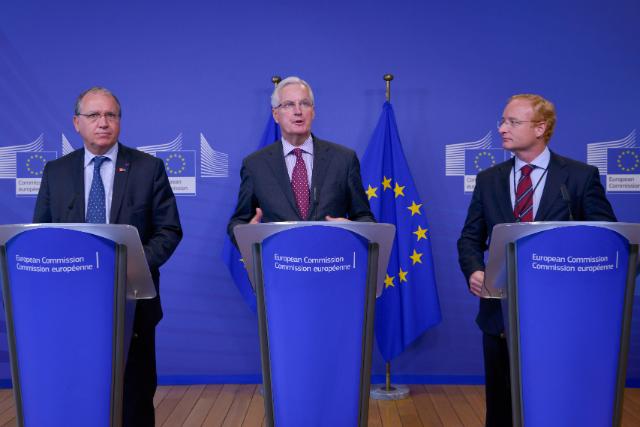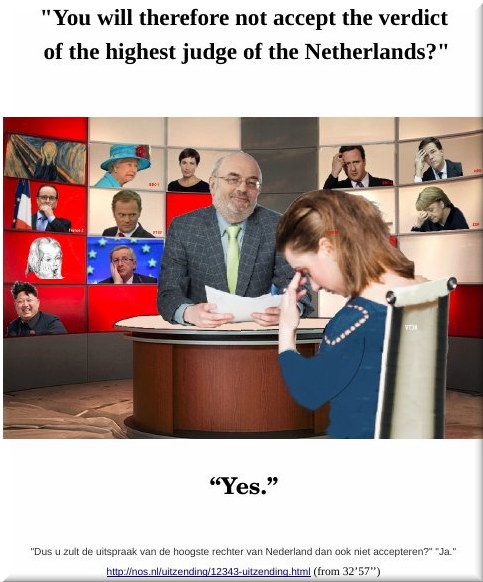

THE situation at the American courts is encouraging. We're pleased to learn that software patents continue to perish (even if the U.S. Patent and Trademark Office (USPTO) keeps granting some) and we post links related to that every day (under "Links"). We wish Europe already had its Alice/35 U.S.C. €§ 101 moment, whereupon the lunacy of software patents in Europe would end. EPO President António Campinos is a barrier to reform; he's another Battistelli, but he looks different (even if he too is French).
"These people are losing everything nowadays because they have bet everything on silly patents covering utterly dumb 'brainfarts'."The demise of software patents in the US is notable and it is measurable. Yesterday we saw Watchtroll's Gene Quinn pretending that Google's poor performance had something to do with patents (in "As Google’s Ad Revenue Slows, Alphabet May Soon Regret Its Anti-Patent Strategy"; it's actually about ads, not patents). We also saw this report about Watchtroll's Paul Morinville, whose fake software patents got trashed (again) by the Federal Circuit. It's hilarious. These are the very same nuts who always blame Google and anyone who disagrees with them is a "Google shill" (we wrote many articles about this ludicrous hypothesis before). These people are losing everything nowadays because they have bet everything on silly patents covering utterly dumb 'brainfarts'. It's a lot like Team UPC and its misguided investment in a rogue regime. It didn't go well, did it? Vincent Look (Womble Bond Dickinson) is apparently not aware that the UPC is dead. He has just repeated famous lies and offered bad advice. Under "What To Know In The Lead-Up To Brexit And The Unitary Patent System" he said: "Patent applicants who wish to file for a European patent and receive patent protection in the United Kingdom (UK) should consider whether they want the European patent to have "unitary" effect and be mindful of the UK's participation in the Unitary Patent system."
What "unitary" effect? There. Is. No. UPC. Need they carry on pretending that only "the UK's participation" is in doubt? Those are the two famous lies we keep pointing out.
Speaking of Team UPC, IP Kat/Bristows carries on with its series about a think tank of the litigation 'industry' (funded by big aggressors). “This session was moderated by Adam Mossoff,” said this tenth part, revealing that Koch-funded stooges are running the show (at the EPO it's patent trolls). The next part showed Paul Michel and then Team UPC's favourite, SPCs. Everything about this think tank should leave no doubts; it's an echo chamber where people come to lie to one another (music to their ears, a symphony). No opposing opinions are permitted or tolerated.
"Everything about this think tank should leave no doubts; it's an echo chamber where people come to lie to one another (music to their ears, a symphony). No opposing opinions are permitted or tolerated."Now, regarding the EPO itself, litigation is high on its agenda. We know this because we see who Campinos keeps meeting (lawyers and their front groups) and who he almost never meets (scientists). D Young & Co LLP's Hanns-Juergen Grosse has just published Double patenting - will prohibition end at last?
We wrote about it last month on several occasions. Today's EPO just wants lots and lots of utterly rubbish European Patents; judging by these upcoming seminars, the EPO is increasingly viewed as an extension of the USPTO (with low patent quality) rather than a legitimate competitor or alternative to it. Both offices nowadays use similar buzzwords as well. Consider Mondaq's latest copy of shameless self-promotion by Philip Cupitt from Marks & Clerk. He is the latest to promote bogus software patents under the guise of "AI" -- something that the USPTO has been encouraging lately. When people who don't code write about "AI" (buzzword/nonsense) it's bound to be laughable like this new piece from IP Kat and here is what Cupitt wrote (with our remarks added):
Patenting Artificial Intelligence [algorithms] At The European Patent Office
Artificial intelligence (“AI”) is one of the most exciting technologies [buzzwords] of our time. Although AI has been a field of research [and practice] for over sixty years, it is only in recent years that it has begun to realise its [full buzzword] potential.
One factor in AI’s coming [marketing] of age has been the development of new machine learning algorithms [or rebranding of these], through which a computer can learn to perform a particular task without being explicitly programmed [although this is hardly new]. The growth of machine learning algorithms has been fuelled by the availability of vast quantities of data [surveillance] from which those algorithms can learn [train], and ever more powerful computer hardware with which to process that data [so it's about scale, not innovation]. (In this article, the term “artificial intelligence” is used to refer to a broad range of technologies that includes machine learning algorithms.)
The rise to prominence of AI [media buzz] has been accompanied by a significant increase in the number of patent applications for [algorithms 'dressed up' as] AI. For example, the EPO has seen more than a fifty per cent increase in the number of European patent applications that broadly relate to [or mention the term] AI over the period from 2010 to 2014 (the most recent year for which the EPO’s statistics are available), with around six thousand such applications in 2014 [because it opened up loopholes]. Over the same period, the EPO has seen nearly a threefold increase in patent applications for so-called “core AI” technology [i.e. double-worded buzzwords].
"The law firms are happy to mislead the public if that means more software patents for them to "sell" (applications/renewals/transfers) and initiate lawsuits over."What is desperately needed right now is a European judgment that makes it crystal clear "AI" patents are just abstract patents that are bunk, void, and nullified. As mentioned by SUEPO last month, the EPO is well aware that it's granting a lot of patents (European Patents) in defiance of the EPC. Also mentioned on Tuesday by SUEPO was this article whose comments are rather revealing. It's about the lack of justice at the EPO, whose judges were sent to 'exile'.
"Would it really be so damaging to the EPO to reverse the decision to send the Boards into exile?"
So says the first comment. Well, that would be a tacit admission that Battistelli did something illegal. Here's the full comment:
Would it really be so damaging to the EPO to reverse the decision to send the Boards into exile?
Of course, applicants might not be happy at the cost and any (short term) inconvenience associated with relocation. However, these factors would easily be outweighed by gains in the long term.
A first gain would be practical, in that applicants would again have a significantly more convenient location (with respect to travel, accommodation and local amenities) for oral proceedings before the Boards.
Another gain, however, would be much more important. That is, the Enlarged Board of Appeal would establish a precedent for reversing decisions of the EPO’s executive (the President and the AC) that do not respect the rule of law.
The AC and the President have, upon multiple occasions, effectively demonstrated contempt for the rule of law – as is evident, for example, from the plainly absurd questions referred to the EBA in G3/19. For the EPO to stand any chance of maintaining (or rebuilding) the confidence of applicants and the public, it is imperative that this situation is addressed.
Whilst it is perhaps possible that the EBA may find nothing wrong with the relocation of the Boards to Haar, they should certainly not be strong-armed into reaching that conclusion. Indeed, the EBA should be free to reach their own conclusion, even if this might cause practical problems for the EPO.
Let’s be honest, reversing the relocation of the Boards would not damage the reputation of the EPO so much as it would damage the reputation of the INDIVIDUALS (within the EPO’s management and the AC) that were involved in proposing or accepting that relocation. It might just also make the political masters of the delegates to the AC sit up and take notice of the negative consequences of turning a blind eye to the rule of law at the EPO.
Interesting approach. The law is the law but if righting a wrong would cost money then overlook it?
Yes, the EPO has to be prudent with the money it receives, but committing a lot of money to an illegality is not good grounds for perpetuating it. Holding responsible those who got it wrong would be the correct procedure.
I agree with you that the EPO should treat the funds it receives with respect. However, considering the whole picture I arrive at the opposite conclusion. I am told that since the Boards moved to Haar about 1,5 years ago the oral proceedings facilities in the Isar building are barely used. The office space that they used in the Isar building is now occupied by staff formerly located in the Pschorr, with the result that half of one of the Pschorr buildings is completely empty. Apparently the EPO has even to pay money for this empty building: cleaning services, maintenance and I am told even penalties for the partly unoccupied canteen. Thus the EPO is actually wasting the money for the location of Haar plus the costs for the maintenance of it empty building and oral proceedings rooms. The relocation of the Boards is a perfect example of waste of public money. The longer it lasts the more money will be wasted. And all this for a location that neither the users nor (apparently) the staff like. Thus I hope that, whatever the Enlarged Board will decide, Mr. Campinos will end this farce and move the Boards back to one of the EPO buildings in Munich. The sooner the better.
Taking off from where our last article in this series ended; another referral to the Enlarged Board of Appeal (EBA), G2/19, includes questions relating to two seemingly unrelated matters. The first question relates to whether an appeal filed by a third party is, at first glance, inadmissible. The second question relates to a suggestion that the location of the EBA may no longer be in conformity with the EPC, following their move to the municipality of Haar, which lies just outside Munich.
[...]
In the referral, the second question to the EBA includes the statement that "no other remedy is available to third parties". This, of course, is true by design so that third parties don't do exactly what is happening here, i.e. file third party observations and appeal if the application still proceeds to grant. In this case, it appears the third party is not entitled to appeal and, regarding the Article 84 EPC issue, if it's good enough for the Examiner, many might say that should be good enough for the third party.
The second part of this referral relates to the question of whether the new location of the Boards of Appeal is contrary to the EPC, because it means that at least one section of the EPO is no longer located in either Munich or The Hague (Article 6 EPC). This question appears to have nothing to do with the first two questions forming the basis for this referral to the EBA, and indeed it may give a hint as to why the appeal exists at all.
